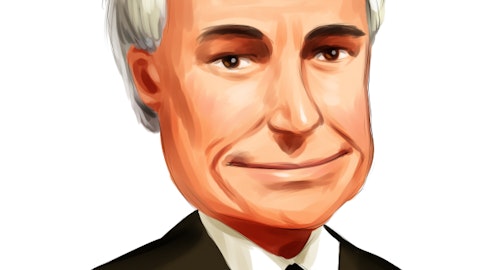There are studies showing that companies with heavy insider selling tend to generate lower stock returns over the following 12 months than companies witnessing insider buying. Similarly, there is evidence showing that the link between insider trading behavior and stock performance is more evident at smaller companies, which also means that there is a greater chance that outside investors can generate abnormal returns by mimicking insiders’ moves at smaller companies rather than at companies with larger market caps. Considering that insider selling is perceived as a sign of weak future stock performance, monitoring this type of insider trading activity can serve as an important tool in one’s stock analysis process. The Insider Monkey team identified three companies with notable insider sales last week, so this article will thoroughly discuss those trades.
Prior to discussing the insider trading activity, let’s make you familiar with what Insider Monkey does besides monitoring insider trading behavior. At Insider Monkey, we track around 730 hedge funds and institutional investors. Through extensive backtests, we have determined that imitating some of the stocks that these investors are collectively bullish on can help retail investors generate double digits of alpha per year. The key is to focus on the small-cap picks of these funds, which are usually less followed by the broader market and allow for larger price inefficiencies (see more details about our small-cap strategy).
NVR Inc. (NYSE:NVR) had two corporate insiders sell shares this past week. To start with, Chief Financial Officer Daniel David Malzahn offloaded 500 shares on Friday at a price of $1,637.96 per share, trimming his overall stake to 2,725 shares. Director Melquiades R. Martinez discarded 375 shares on the same day for $1,638.59 each and currently owns 181 units of common stock. The shares of the homebuilder have advanced by 29% over the past 12 months and by 107% over the past five-year period, which makes it quite clear why NVR’s insiders feel comfortable unloading shares. But did they offload shares at the right time? NVR Inc. (NYSE:NVR)’s price-to-earnings multiples suggest that the company is still quite undervalued relative to the broader market at the moment. For instance, NVR has a forward P/E multiple of 12.57, which is well below the average of 15.89 for the companies included in the S&P 500 benchmark.
NVR primarily focuses on building and selling single-family detached homes, townhomes and condominium buildings, so its financial performance is highly dependent on the demand for new homes. Although the demand for new homes improved last year, the prices of these homes were under pressure from the increase in the number of new home communities in numerous markets. Despite that, NVR posted consolidated revenue of $5.16 billion for 2015, up from $4.44 billion reported for 2014. In a similar manner, the company’s net income grew by 36% year-over-year to $382.93 million. A total of 21 hedge funds from our system were invested in the homebuilding company at the end of the third quarter, and had accumulated almost 13% of its outstanding common stock. Pennant Capital Management, founded by Alan Fournier, owns 161,737 shares of NVR Inc. (NYSE:NVR) as of September 30.
Follow Nvr Inc (NYSE:NVR)
Follow Nvr Inc (NYSE:NVR)
Receive real-time insider trading and news alerts
Let’s move on to the next page of this article, which reveals the insider sales registered at Murphy Oil Corporation (NYSE:MUR) and Neogen Corporation (NASDAQ:NEOG).
Murphy Oil Corporation (NYSE:MUR) also had one of its insiders sell shares earlier this week. Director Caroline G. Theus reported selling 28,500 shares on Monday at a weighted average price of $18.61, of which 10,500 shares were held by her spouse, while the remaining shares were held jointly with her spouse. The Director also holds a direct ownership stake of 417,357 shares. The international oil and gas company has seen its shares decline by more than 64% over the past year, though as commodities prices could slide even further, the floor may not have yet been reached for the stock.
Murphy Oil reported a net loss of $2.27 billion for 2015, which included non-cash impairments of oil and natural properties equal to $2.49 billion. Let’s try to assess the financial health of the company by looking at its balance sheet, which reveals $2.83 billion of outstanding debt that consists of $2.25 billion of long-term, fixed-rate bonds with a weighted average coupon of 4.07%. The company has cash and liquid invested securities amounting to $456.0 million as of the end of 2015, but also has $600.00 million available on its $2.00 billion revolving credit facility. Meanwhile, Murphy Oil anticipates that its 2016 capital expenditures for operations will reach $825.00 million, which would denote an decrease of 62% relative to the $2.19 billion figure spent last year. There were 27 smart money managers monitored by Insider Monkey that were invested in the oil and gas company at the end of September, with them stockpiling nearly 11% of its shares. Mason Hawkins’ Southeastern Asset Management holds a 6.71 million-share position in Murphy Oil Corporation (NYSE:MUR) as of the end of the third quarter.
Follow Murphy Oil Corp (NYSE:MUR)
Follow Murphy Oil Corp (NYSE:MUR)
Receive real-time insider trading and news alerts
Last but not least, Neogen Corporation (NASDAQ:NEOG) had an executive unload shares last week. Terry A. Morrical, Vice President of Animal Safety Operations at Neogen, sold 4,677 units of common stock on Friday at a price of $51.13 per unit and currently holds a stake of 39,583 shares. The shares of the food and animal safety company are up by 12% over the past 12 months and trade at rather expensive P/E ratios. For example, the company has a forward P/E multiple of 41.43, which can partially be justified by the great expectations for the company’s bottom- and top-line growth rates that some investors and analysts have. Bob Mitchell, co-manager of small cap-focused mutual fund Conestoga Small Cap fund, believes that Neogen can generate revenue growth in the low double-digits and register operating income growth in the range of 15% to 20% annually over the next three-to-five years. This seems to justify the company’s high valuation at the moment, but it remains to be seen whether the company will be able to meet Mitchell’s expectations.
Revenue from the company’s Food Safety segment totaled $71.71 million for the six months that ended November 30 and accounted for 46% of total revenue, compared to $63.92 million reported for the segment during the same period of the prior year. At the same time, Animal Safety segment revenue increased to $82.76 million from $72.14 million reported a year earlier. The smart money sentiment towards the stock was very positive in the third quarter, considering that the number of funds with positions in the company grew to 13 from eight quarter-over-quarter. Jim Simons’ Renaissance Technologies owned almost 273,000 shares of Neogen Corporation (NASDAQ:NEOG) at the end of September.
Follow Neogen Corp (NASDAQ:NEOG)
Follow Neogen Corp (NASDAQ:NEOG)
Receive real-time insider trading and news alerts
Disclosure: None




